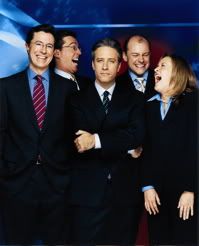 San Francisco State University journalism professor Venise Wagner is at odds with her students on categorizing "The Daily Show."
San Francisco State University journalism professor Venise Wagner is at odds with her students on categorizing "The Daily Show."Her students think the show is journalism. Wagner argues that it's satire.
"They don't do their own reporting -- it's entertainment wrapped around news. I tell my students, 'You may be learning something and you may be having fun while you're learning it, but you're not getting news.'"
Now I don't know what reasons her students gave to back up their claim, but I think it's possible that their class is at odds because each party is defining "news" and "journalism" differently. After all, does news entertain? (Therefore, is the New York Post journalism?) Must one do their own reporting? (Thus, is a story from the AP true 'journalism' by the newspaper?) The list goes on.
I personally think the Daily Show is light, but in no way definitive, news. But it is NOT journalism. It IS satire. It IS entertainment. But it is also news, and I get about the same information from watching the show as I can scanning the headlines of the aformentioned Post.
Chip Scanlan once replied to a comment I made to his column about what defines a newspaper, a magazine, a journal, "new media," etc. In his comment, he said the following:
"Why can't we dispense with the idea of who came first and instead focus on what journalists and the industry that supports them provide democratic societies--information, news, knowledge, stories and on the best days, wisdom. Let's stop wringing our hands and acknowledge the different way people consume these commodities today, from landing on the frontstep to the inbox."
And I think in Wagner's situation, it's best to heed Chip's advice. What we should do is acknowledge that things aren't cut and dry, and that the Daily Show is a blend of many things, including news, satire, and on one level, some form of journalism (otherwise, how would they get their information?). With that acknowledged, she and her J-students can better spend time analyzing the unique way the Daily Show has impacted "traditional" journalism - after all, it's radically different from the show Craig Kilborn introduced years ago - and go from there.
Wanger's public journalism class emphasizes, in her own words, "the impact of poverty on people's lives, so they are not judging people or judging situations without totally understanding the impact of socio-economic systems." Can't we simply evaluate the impact of satire like the Daily Show so that we, as journalists, aren't judging events without totally understanding the role the show plays in politics and the media?
Neither is conventional journalism. But what is, really?
I'm in complete support of what Wagner does, and I think she's doing a great service to the future of the craft (Vocation? Industry? You decide.) But I do think that, if she's having this argument semester after semester, it might be worth exploring and ameliorating instead of perpetuating.
Maybe not all of her students, many directly out of high school, will get it. But there's no point in telling them what is and what isn't. It may be better to, with presented evidence from both sides of the argument, let them decide for themselves. That approach, I think, is the most beneficial for the future.


![Editorialiste [at] gmail](https://blogger.googleusercontent.com/img/b/R29vZ2xl/AVvXsEjzDvlHqUd5msfCmRq2Q5EZRpn_nbVg33bjiUhLEigM_5fudZhIHvuAVxB4_MS0xn-cQ0EKyjxOua1ysQ4NdMzyvhg1oSVTv6OJAarhVTqG0BBkJKTjqBhwMjrMGOANWxT8l8rKFg/s220/editorialiste_logo.jpg)
No comments:
Post a Comment